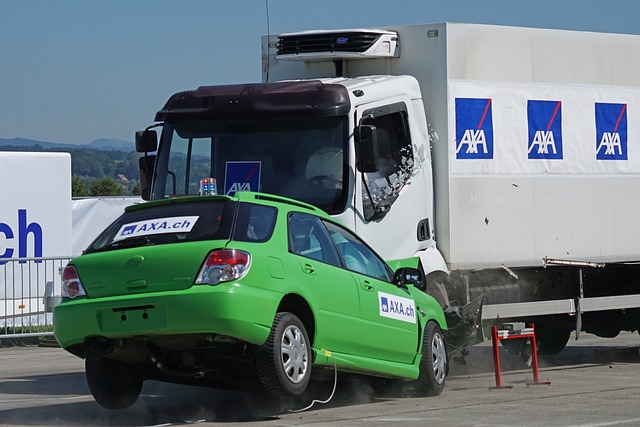Motorcycle accidents can cause severe spinal cord injuries (SCIs), with high-speed collisions leading to compression, severing, or tearing of spinal tissues. SCIs result in paralysis or loss of sensation below the injury point and require immediate medical intervention followed by long-term care, including physical therapy and surgery. Victims face daily challenges and need adjustments to regain mobility and independence. Insurance disputes are common, and legal assistance from a car accident lawyer is often sought for fair compensation. Effective post-accident care involves specialized treatment, rehabilitation, and support addressing physical, emotional, and psychological needs.
“Motorcycle accidents can lead to devastating spinal cord injuries (SCIs), impacting victims’ mobility and quality of life. This article delves into the complex world of SCIs, exploring their causes and far-reaching effects specifically within the context of motorcycle crashes. We’ll dissect the common scenarios leading to these injuries and examine strategies for managing and recovering from post-accident care. Understanding these aspects is crucial for both victims and medical professionals in navigating the challenges posed by motorcycle accident spinal injuries.”
- Understanding Spinal Cord Injuries: A Comprehensive Overview
- Common Causes of Spinal Injuries in Motorcycle Crashes
- Impact and Management Strategies for Post-Accident Care
Understanding Spinal Cord Injuries: A Comprehensive Overview

Spinal cord injuries (SCIs) resulting from motorcycle accidents are a severe and life-altering consequence that demands comprehensive understanding. These injuries occur when the spinal cord, a vital communication link between the brain and the body, suffers damage due to trauma. In the context of motorcycle accidents, high-speed collisions can lead to compression, severing, or tearing of the spinal cord tissues, resulting in various degrees of paralysis or loss of sensation below the point of injury.
SCIs are categorized based on their severity: incomplete or complete, and their location along the spine. A complete SCI disrupts all communication below the level of injury, leading to total muscle weakness or paralysis in the affected areas, while an incomplete SCI allows for some nerve function and sensation. Regardless of type, SCIs often require immediate medical intervention and long-term care, including physical therapy, rehabilitation, and in some cases, surgical procedures aimed at reducing pressure on the spinal cord. The impact extends beyond physical injuries, as individuals with SCIs may face challenges in their daily lives, necessitating adjustments and support from healthcare professionals and caregivers to regain mobility and independence.
Common Causes of Spinal Injuries in Motorcycle Crashes

Motorcycle accidents can lead to a range of serious injuries, but spinal injuries are among the most severe and life-altering. Common causes of spinal injuries in motorcycle crashes include high-speed collisions with cars, loss of control leading to high-impact falls, and being struck by another vehicle while riding alongside or behind it. These incidents can result in damage to the vertebrae, discs, nerves, and surrounding soft tissues, potentially causing partial or complete paralysis below the point of impact.
The force exerted during a motorcycle accident often exceeds the body’s ability to absorb shock, particularly in the spine. This can lead to various conditions such as fractured vertebrae, herniated discs, or spinal cord compression. Additionally, riders might experience spinal injuries due to being thrown from their bike or hitting hard surfaces upon impact. Insurance disputes over compensation for these severe injuries are not uncommon, and many victims seek legal assistance to ensure they receive fair compensation for medical bills, rehabilitation, and lost wages from a car accident lawyer.
Impact and Management Strategies for Post-Accident Care

The impact of a motorcycle accident resulting in a spinal injury can be severe and life-altering. Immediate post-accident care is critical to managing pain, preventing further damage, and promoting healing. Victims often require specialized medical attention, including emergency room treatment, hospitalization, and subsequent rehabilitation. The management strategies for these cases focus on stabilizing the spine, reducing inflammation, and providing supportive care to improve patient outcomes.
Effective management involves a multidisciplinary approach, with healthcare professionals working together to address physical, emotional, and psychological needs. This includes physiotherapy, occupational therapy, and counseling to help individuals adapt to their new circumstances. Additionally, legal considerations, such as breach of fiduciary duty or partnership disputes, may arise, necessitating support from specialists in these areas to ensure the victim receives fair compensation and proper care throughout the recovery process.
Motorcycle accidents can lead to devastating spinal injuries, emphasizing the need for a comprehensive understanding of their causes and management. This article has explored the intricate details of spinal cord injuries, from their diverse causes in motorcycle crashes to the profound effects on individuals’ lives. By highlighting these aspects, we aim to raise awareness and promote effective post-accident care strategies. Recognizing the unique challenges faced by victims is crucial for fostering better support systems and improving recovery outcomes for those affected by motorcycle accident spinal injuries.






